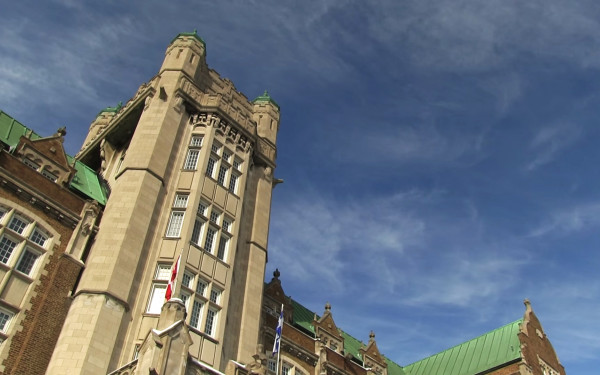Three Concordia Researchers Set Out to Decolonize Contemporary Physics Research
New Frontiers in Research Fund Winners Seek to Involve Indigenous Knowledges in Light
Physics has historically been a white, male dominated field—more so than any other science, technology, engineering, and mathematics field. This creates and reproduces inequalities, reflected in the under representation of women, racial minorities, and Indigenous peoples.
This is why three researchers at Concordia are determined to create change in the way physics is seen and taught at the university. They have set out to decolonize physics research by engaging in intersectional dialogue and research initiatives, involving more Indigenous students, and increasing funding dedicated to Indigenous researchers and research projects.
In May, Tanja Tajmel, Louellyn White, and Ingo Salzmann were awarded the university’s first New Frontiers in Research Fund, valued at over $163,000. The grant is part of a federal initiative to support interdisciplinary and international research, and the money will be used by the three researchers to fund bursaries for Indigenous researchers and research initiatives to further their goal of Indigenizing physics.
The three researchers will focus their work on light specifically. According to their website, they decided to go with light because it’s omnipresent across all languages, societies, and cultures. It’s a key aspect in our lives, defining things like warmth and colour.
Speaking specifically within the context of physics, “light is both regarded as primary carrier of information on nature (e.g. in astronomy) and exploited as primary probe for the fundamental properties of nature (e.g. in spectroscopy).
Despite the fact that everyone knows light and each culture has its own knowledge of it, only the physical knowledge of it is regarded as being scientific. The three co-investigators are interested in finding out how colonial authorities deciding what is considered scientific continue to make those decisions in the context of light. Tajmel—who is fascinated by the northern lights—in particular questioned these colonial assumptions.
“We are teaching this content to our students without sufficient historical context and geopolitical awareness,” said Tajmel, associate professor at the Centre for Engineering in Society in the Gina Cody School of Engineering and Computer Science, in an interview with Concordia. “Who benefits from this knowledge? What do Indigenous people know about light? Why don’t we know about it?”
Searching for these answers, she turned to her colleagues in the Faculty of Arts and Science. White is an associate professor in the First Peoples studies program and Salzmann an associate professor of physics.
White, who is Kanien’keha:ka and a member of the university’s Indigenous Directions Leadership Group, said Indigenous ways of knowing have been suppressed and marginalized in academic history. But, there is momentum being gained in elevating Indigenous knowledge as equally valid as Western science.
“If we, as an institution, do not embody the territorial acknowledgement by recognizing and affirming the expertise of our Elders as Knowledge Keepers, the acknowledgement becomes nothing but empty platitudes,” she said.
Often in Western thought, the concept of light has been accepted as a scientific concept through the work of the likes of Isaac Newton, Max Planck, and Albert Einstein. Rarely do we examine how light is viewed culturally, or how light could be viewed from a perspective that isn’t strictly scientific. According to Salzmann, it is important that physics and light become a part of critical discourses emerging in academia.
“The culture of physics certainly changes with diverse people involved,” he said. “Therefore, decolonizing science involves challenging the underlying hierarchies.”
“Through this project, physics students will engage in these discourses, and I hope that with this initiative we can support students from underrepresented groups, especially from Indigenous communities, to participate in science,” he continued.
There is much to be gained through this project, White feels. The survival of Elders depended on the observation of weather and migration patterns as well as expertise in subsistence ways of living, she said.
“Our Elders’ wisdom and their contribution to knowledge creation at Concordia is just as important as that of the Western scientist, maybe more so, given the state of the world today.”
The researchers recognize the importance of raising awareness of colonialism in science. According to White, decolonizing science is really about taking down systemic barriers and making space for open conversations and relationships.
“When non-Indigenous educators step out of a place of defensiveness or self-blame and investigate colonial history of academia while looking inward at their own participation, the door can be opened for understanding Indigenous worldviews,” she said. “It cannot and should not be up to Indigenous educators alone to create a more inclusive learning environment at Concordia.”
According to the website for this project, decolonizing light will take shape by studying colonial anchor points in the history of the field as well as the views of scientists on colonialism itself. In addition, they will investigate conversations around large scale light experiments while passing along what is learned to Indigenous students.
“We are training Indigenous and racialized students to do research in synchrotrons, and we are encouraging and training Indigenous and racialized students to follow research questions which are not defined by us but by themselves,” the website reads.
The redistribution of funds to Indigenous students and researchers is an integral part of this initiative, per Tajmel. With 90 per cent of funding going directly to Indigenous people as bursaries and funding for research projects, as well as honoraria for Elders and Knowledge Keepers, this is an important step towards decolonizing academia.
Tajmel recognizes, however, that this does not contribute to structural changes like the creation of positions for Indigenous researchers. “This must be done at a different level. But we can train students to become qualified applicants for such positions,” she said.
“We envision a modern scientist or engineer who is able to critically reflect on his or her own scientific culture, who knows about different knowledges and about the role of science in reproducing social inequity.”
The three founding members are currently looking for master’s and PhD students who may be interested in contributing towards research projects like “cultural ideas about light in Indigenous knowledges and philosophies” and “physicists’ views on colonialism in science.”




_600_375_90_s_c1.jpg)
_600_375_90_s_c1.jpg)

